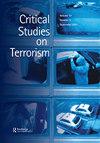Public inquiries on counterterrorism: New Zealand’s experience
IF 2.5
Q2 POLITICAL SCIENCE
引用次数: 0
Abstract
ABSTRACT In the aftermath of major terrorist attacks, governments create public inquiries to establish the facts of the matter, expose those facts to public scrutiny, find fault, allocate blame, ensure accountability, and restore public confidence. Yet few studies pay close attention to these responses as a practice of remedial intervention into official counterterrorism efforts. Based on our examination of New Zealand’s Royal Commission of Inquiry into the Terrorist Attack on Christchurch Mosques on 15 March 2019, we argue that two contending approaches to national security shaped the inquiry’s design and informed its conduct. On the one hand, an established whole-of-government approach produced design features that led the inquiry to reproduce the orthodox logic of security professionals and entrench existing security policy and practices. On the other hand, a revisionist approach sought to use the inquiry as a means of furthering the Government’s social cohesion policy agenda and to strengthen democratic protections for minority groups. However, the implementation of the inquiry’s recommendations reveals a deep commitment to the whole-of-government approach to national security, which appears to co-opt civil society representatives and marginalise dissenting voices. This, in our view, leaves New Zealand society little better off when it comes to understanding the nature and scale of the threat posed by terrorism or responding to a diverse array of other security challenges.公众对反恐的调查:新西兰的经验
在重大恐怖袭击发生后,政府会发起公众调查,以确定事件的真相,将这些事实暴露在公众监督之下,找出错误,分配责任,确保问责,并恢复公众信心。然而,很少有研究密切关注这些反应,将其作为对官方反恐努力的补救干预。根据我们对新西兰皇家调查委员会对2019年3月15日克赖斯特彻奇清真寺恐怖袭击事件的审查,我们认为,两种相互冲突的国家安全方法影响了调查的设计并影响了其行为。一方面,既定的整个政府方法产生了设计特征,导致调查再现了安全专业人员的正统逻辑,并巩固了现有的安全政策和实践。另一方面,修正主义的做法试图利用调查作为促进政府社会凝聚力政策议程和加强对少数群体的民主保护的手段。然而,调查建议的实施表明,政府对国家安全的整体方法有着深刻的承诺,这种方法似乎拉拢了民间社会的代表,并将不同的声音边缘化。我们认为,在理解恐怖主义构成的威胁的性质和规模或对各种各样的其他安全挑战作出反应方面,这并没有使新西兰社会变得更好。
本文章由计算机程序翻译,如有差异,请以英文原文为准。
求助全文
约1分钟内获得全文
求助全文

 求助内容:
求助内容: 应助结果提醒方式:
应助结果提醒方式:


